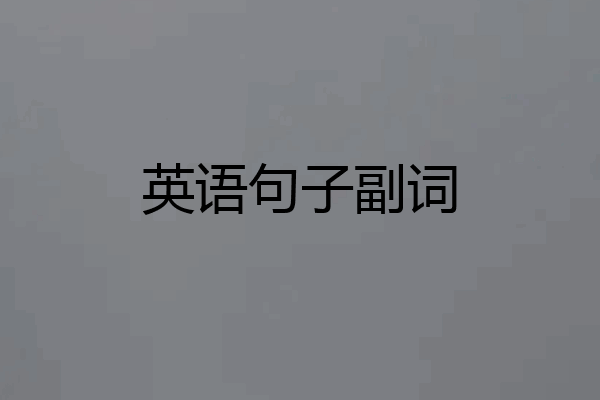
清晨小雨818
me stretches before us in the constant panorama of more days and months and years to


荷兰小乳牛
英语副词在句中可作状语,表语,补语,定语。
1、He works hard。(作状语)他努力工作。
2、You speak English very well。(作状语)你英语讲得相当好。
3、Does she stay home? (作表语)她呆在家吗?
4、Let him out!(作补语)让他出去!
副词用以修饰动词、形容词、其他副词或全句,表示时间、地点、程度、方式等概念,副词可分为:时间副词、频率副词、地点副词、方式副词、程度副词、疑问副词、连接副词、关系副词、表顺序的副词以及表完成的副词。
各类副词介绍
1、时间频率副词
主要表示“什么时候”“经常与否”形容动作所做的次数或频繁程度”,如:now,then,often,always,usually,next,after,lastday,already(已经),generally(一般地)
2、地点副词
表示地点与位置关系的副词,用来说明动作是在什么地方发生的。如:here, there, everywhere, anywhere,somewhere, in, out, inside, outside
3、方式副词,如:carefully, properly(适当地), anxiously(焦虑地), suddenly, normally(正常地)
4、程度副词,如:much,little, very,rather(相当),so,too,still, quite, perfectly(完美地),enough, extremely(非常), entirely(整个)

chaorenxiaoling
英语副词有:now,then,often,always,usually,next,lastday,already等。副词是一种用来修饰动词、形容词、全句的词。一些副词如very,so,too,enough,quite等修饰形容词或副词的原级。
(1)时间频率副词
now,then,often,always,usually,next,lastday,already(已经),generally(一般地)。
(2)地点副词
here, there, everywhere, anywhere,somewhere, in, out, inside, outside。
英语中副词的作用是:
副词是指在句子中表示行为或状态特征的词,用以修饰动词、形容词、其他副词或全句,表示时间、地点、程度、方式等概念。
副词可分为:时间副词、频率副词、地点副词、方式副词、程度副词、疑问副词、连接副词、关系副词、表顺序、表完成的副词。

BeiJing我的爱
副词在句子中,可以充当状语,表语,宾语,宾语补足语以及定语。用作状语 1. 用作状语Look at the photo carefully. 仔细看看这张照片。You’re driving too fast. 你开车开得太快了。2. 用作表语The meeting is over. 会议结束了。Is anyone upstairs? 楼上有人吗?Is the radio on or off? 收音机是开着的还是关着的?【注】在通常情况下,用作表语时不用副词而用形容词,如可说The woman is beautiful. 而不说 The woman is beautifully. 可说The cloth feels soft. 不能说 The cloth feels softly. 英语中用作表语的副词主要是表地点的副词以及某些与介词同形的副词,而且只能用于连系动词be 后作表语,而不用于其他连系动词后作表语,如可说He is here 或 He is abroad,但不能说He seems here 或 He seems abroad。3. 用作宾语It’s hot in here. 这里面很热。It’s not far from here. 从这儿去不远。I’ll stay at home tonight. 今晚我将呆在家里。【注】副词用作宾语的用法十分有限,通常只用作介词宾语,并且只限于某些表示时间和地点的副词,而且不同的副词有不同的搭配特点,如 here和there 可与along, around, down, from, in, near, round, up 等介词连用,但通常不与介词to连用,如不说come to here, go to there 等(注:from here to there是例外),而表地点的副词abroad 则只与介词from连用,不与其他介词连用。4. 用作宾语补足语Ask him in, please. 请叫他进来。We must try to help him through. 我们必须设法帮他渡过难关。Sorry to have kept you up so late. 对不起,让你这么晚不能睡觉。【注】一般说来,能用作表语的副词都可用作宾语补足语:He went to see her but found that she was out. 他去看她,但发现她不在家。He went to see her but found her out. 他去看她,但发现她不在家。5. 用作定语The people there were very friendly. 那儿的人很友好。Do you know the people downstairs? 你认识楼下的人吗?The shops around are very cheap. 附近商店的东西很便宜。【注】在通常情况下,副词用作定语总是放在被修饰名词之后,若置于修饰名词之前,则通常被视为形容词,如the upstairs room和the room upstairs 都表示“楼上的房间”,但前者的upstairs 前置,为形容词;后者的upstairs后置,为副词;又如the above passage 和the passage above都可表示“上面的段落”,但前者的above 前置,为形容词;后者的above后置,为副词。
优质英语培训问答知识库